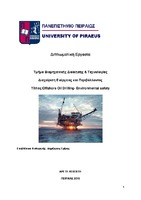Offshore oil drilling - environmental safety

Προβολή/
Θεματική επικεφαλίδα
Πετρέλαιο - Εξόρυξη ; Θαλάσσια ρύπανση ; Oil ; Oil pollution of the sea ; Oil pollution of the sea -- Prevention ; Environment -- PollutionΛέξεις κλειδιά
Oil industryΠερίληψη
Ο σκοπός της εργασίας αυτής είναι να καθοριστούν οι διαδικασίες που οδηγούν σε μόλυνση του περιβάλλοντος σε ένα υπεράκτιο έργο εξόρυξης πετρελαίου, οι παράγοντες που επηρεάζουν την επίτευξη ενός υπεράκτιου έργου εξόρυξης πετρελαίου και ποιοι από αυτούς είναι ικανοί να οδηγήσουν σε αποτυχία και ατύχημα, καθώς και ο ρόλος του project management στην επίτευξη αυτού του έργου. Για να καταλήξουμε σε συμπεράσματα θα έπρεπε να περιγράφει η διαδικασία από την αρχή, δηλαδή από το στάδιο της εξερεύνησης, μέχρι το στάδιο της γεώτρησης και εξόρυξης.
Ο τρόπος με τον οποίο συλλέχθησαν τα παραπάνω στοιχεία είναι μέσα από την επιστημονική βιβλιογραφία και δεδομένα διαθέσιμα στο διαδίκτυο. Η επιστημονική έρευνα για το θέμα αυτό είναι πολύ μεγάλη και έγινε μια προσπάθεια να αναπτυχθούν σύντομα τα διάφορα κεφάλαια και να καταλήξουμε σε κάποια συμπεράσματα.
Τα συμπεράσματα της παρούσας διατριβής συνοψίζονται ως εξής.
• Η λήψη αποφάσεων με περιβαλλοντικό χαρακτήρα σε έργα εξόρυξης πετρελαίου είναι συνήθως μια περίπλοκη διαδικασία λόγω αντικρουόμενων στόχων ή κριτηρίων, ασαφή δεδομένα, και αλληλεξάρτηση μεταξύ των ομάδων των φορέων λήψης αποφάσεων.
• Ο ρόλος της διαχείρισης του έργου είναι πολύ σημαντικός για την επιτυχία του έργου.
• Η βιομηχανία πετρελαίου και φυσικού αερίου έχει μετακινηθεί από μια αντιδραστική προσέγγιση σε μια προληπτική προσέγγιση για την ασφάλεια.
• Τα υψηλότερα επίπεδα του στρες και η κούραση, συνδέεται με χαμηλότερα επίπεδα επίγνωσης κατάστασης, η οποία με τη σειρά της είναι ενδεικτική της αυξημένης συμμετοχής στις ανασφαλείς συμπεριφορές στην εργασία, και αυξημένο κίνδυνο ατυχημάτων.
• Τα ατυχήματα έδειξαν ότι οφείλονταν σε ανθρώπινο λάθος.
• Στην περίπτωση του Κόλπου του Μεξικού, η πιο σημαντική αστοχία -και η σαφής αιτία για την έκρηξη - ήταν μια αποτυχία της διαχείρισης της βιομηχανίας.


